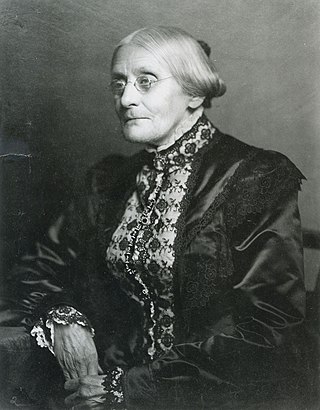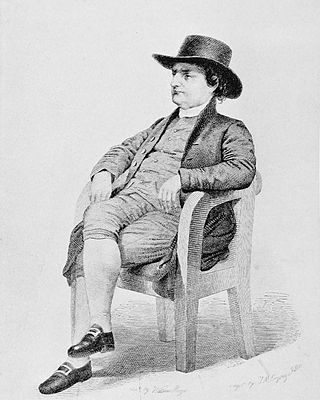
Frederick Douglass was an American social reformer, abolitionist, orator, writer, and statesman. He became the most important leader of the movement for African-American civil rights in the 19th century.

Susan B. Anthony was an American social reformer and women's rights activist who played a pivotal role in the women's suffrage movement. Born into a Quaker family committed to social equality, she collected anti-slavery petitions at the age of 17. In 1856, she became the New York state agent for the American Anti-Slavery Society.

The Seneca Falls Convention was the first women's rights convention. It advertised itself as "a convention to discuss the social, civil, and religious condition and rights of woman". Held in the Wesleyan Chapel of the town of Seneca Falls, New York, it spanned two days over July 19–20, 1848. Attracting widespread attention, it was soon followed by other women's rights conventions, including the Rochester Women's Rights Convention in Rochester, New York, two weeks later. In 1850 the first in a series of annual National Women's Rights Conventions met in Worcester, Massachusetts.

Spiritualism is a social religious movement popular in the nineteenth and early twentieth centuries, according to which an individual's awareness persists after death and may be contacted by the living. The afterlife, or the "spirit world", is seen by spiritualists not as a static place, but as one in which spirits continue to interact and evolve. These two beliefs—that contact with spirits is possible, and that spirits are more advanced than humans—lead spiritualists to the belief that spirits are capable of advising the living on moral and ethical issues and the nature of God. Some spiritualists follow "spirit guides"—specific spirits relied upon for spiritual direction.

Elias Hicks was a traveling Quaker minister from Long Island, New York. In his ministry he promoted doctrines deemed unorthodox by many which led to lasting controversy, and caused the second major schism within the Religious Society of Friends. Elias Hicks was the older cousin of the painter Edward Hicks.

The Religious Society of Friends began as a proto-evangelical Christian movement in England in the mid-17th century in Ulverston. Members are informally known as Quakers, as they were said "to tremble in the way of the Lord". The movement in its early days faced strong opposition and persecution, but it continued to expand across the British Isles and then in the Americas and Africa.

Abigail Hopper Gibbons, née Abigail Hopper was an American abolitionist, schoolteacher, and social welfare activist. She assisted in founding and led several nationally known societies for social reform during and following the American Civil War.

The First Unitarian Church of Rochester is located at 220 Winton Road South in Rochester, New York, U.S. The congregation is one of the largest in its denomination, the Unitarian Universalist Association. The non-creedal church conducts programs in the areas of spirituality, social concerns, music, and arts. This church is one of two Unitarian Universalist congregations in Monroe County, the other being First Universalist Church of Rochester.

Isaac Tatem Hopper was an American abolitionist who was active in Philadelphia and New York City in the anti-slavery movement and protecting fugitive slaves and free blacks from slave kidnappers. He was also co-founder of Children's Village with 23 others.

Quakers are people who belong to the Religious Society of Friends, a historically Protestant Christian set of denominations. Members refer to each other as Friends after John 15:14 in the Bible, and originally, others referred to them as Quakers because the founder of the movement, George Fox, told a judge to quake "before the authority of God". The Friends are generally united by a belief in each human's ability to be guided by the inward light to "make the witness of God" known to everyone. Quakers have traditionally professed a priesthood of all believers inspired by the First Epistle of Peter. They include those with evangelical, holiness, liberal, and traditional Quaker understandings of Christianity, as well as Nontheist Quakers. To differing extents, the Friends avoid creeds and hierarchical structures. In 2017, there were an estimated 377,557 adult Quakers, 49% of them in Africa followed by 22% in North America.

Benjamin Lay was an English-born writer, farmer and activist. Born in Copford, Essex, into a Quaker family, he initially underwent an apprenticeship as a glovemaker before running away to London and finding work as a sailor. In 1718, Lay moved to the British colony of Barbados, which operated on a plantation economy dependent on slave labour. While working as a merchant, his shock at the brutal treatment of slaves in Barbados led Lay to develop lifelong abolitionist principles, which were reinforced by his humanitarian ideals and Quaker beliefs.

Amy Kirby Post was an activist who was central to several important social causes of the 19th century, including the abolition of slavery and women's rights. Post's upbringing in Quakerism shaped her beliefs in equality of all humans, although she ultimately left the Religious Society of Friends because of her desire to actively support social change efforts that called upon her to collaborate with non-Quakers. A friend of many prominent activists including Frederick Douglass and Susan B. Anthony, Post provided key support to the causes that she believed in both publicly and in less-public ways. She was a signer of the 1848 Declaration of Sentiments and a life-long activist who committed herself to work toward a range of intersecting social issues. This blended activism approach sets Post apart from many other activists of her time who advocated for a single issue in the hopes that doing so would lead to sufficient social change.

Thomas M'Clintock was an American pharmacist and a leading Quaker organizer for many reforms, including abolishing slavery, achieving women's rights, and modernizing Quakerism.

Abigail Norton Bush was an abolitionist and women's rights activist in Rochester, New York. She served as president of the Rochester Women's Rights Convention, which was held in 1848 immediately after the first women's rights convention, the Seneca Falls Convention. By doing so, Bush became the first woman to preside over a public meeting composed of both men and women in the U.S.

Lucretia Mott was an American Quaker, abolitionist, women's rights activist, and social reformer. She had formed the idea of reforming the position of women in society when she was amongst the women excluded from the World Anti-Slavery Convention held in London in 1840. In 1848, she was invited by Jane Hunt to a meeting that led to the first public gathering about women's rights, the Seneca Falls Convention, during which the Declaration of Sentiments was written.

Sarah Mapps Douglass was an American educator, abolitionist, writer, and public lecturer. Her painted images on her written letters may be the first or earliest surviving examples of signed paintings by an African American woman. These paintings are contained within the Cassey Dickerson Album, a rare collection of 19th-century friendship letters between a group of women.

The Rochester Women's Rights Convention of 1848 met on August 2, 1848 in Rochester, New York. Many of its organizers had participated in the Seneca Falls Convention, the first women's rights convention, two weeks earlier in Seneca Falls, a smaller town not far away. The Rochester convention elected Abigail Bush as its presiding officer, making it the first U.S. public meeting composed of both sexes to be presided by a woman. This controversial step was opposed even by some of the meeting's leading participants. The convention approved the Declaration of Sentiments that had first been introduced at the Seneca Falls Convention, including the controversial call for women's right to vote. It also discussed the rights of working women and took steps that led to the formation of a local organization to support those rights.
Sarah Davids Bills Fish (1798–1868) was a 19th-century American suffragist and abolitionist. She has been variously known as Sarah Fish, Sarah D. Fish, Sarah David Bills, and Sarah David Bills Fish.

Catharine A. Fish Stebbins was an American abolitionist and suffragist. She lectured against slavery and fought for her right to vote in New York and Michigan.
The Progressive Friends, also known as the Congregational Friends and the Friends of Human Progress, was a loose-knit group of dissidents who left the Hicksite branch of the Society of Friends (Quakers) in the mid-nineteenth century. The separation was caused by the determination of some Quakers to participate in the social reform movements of the day despite efforts by leading Quaker bodies to dissuade them from mixing with non-Quakers. These reformers were drawn especially to organizations that opposed slavery, but also to those that campaigned for women's rights. The new organizations were structured according to congregationalist polity, a type of organization that gives a large degree of autonomy to local congregations. They were organized on a local and regional basis without the presence of a national organization. They did not see themselves as creators of a new religious sect but of a reform movement that was open to people of all religious beliefs.



















